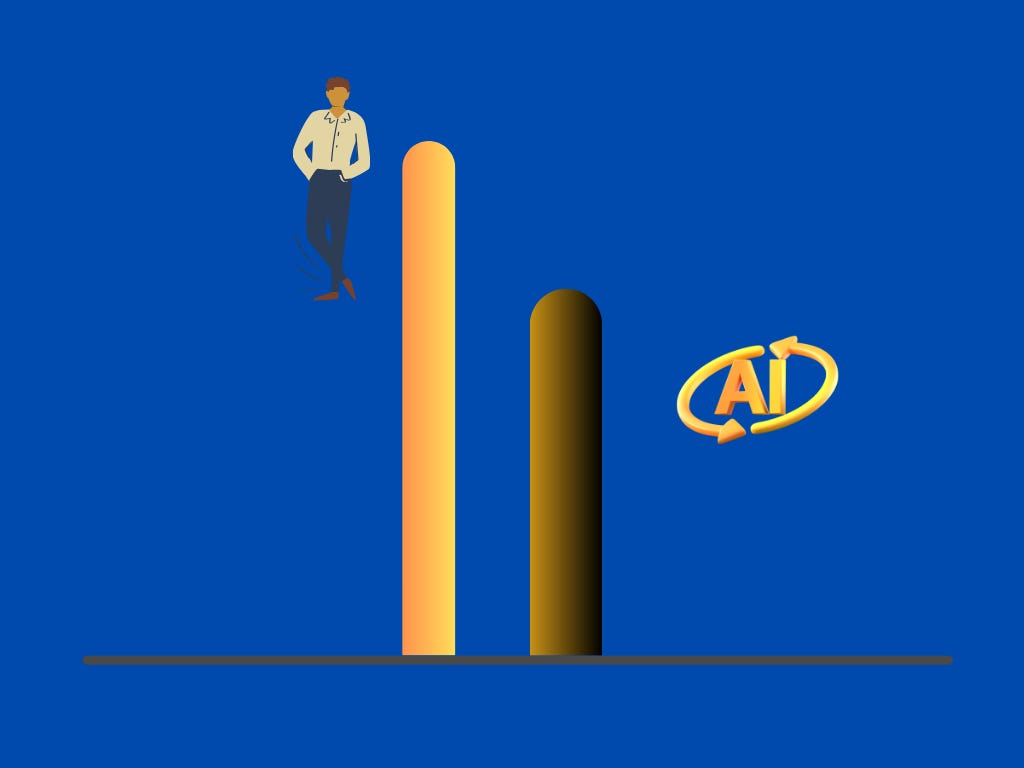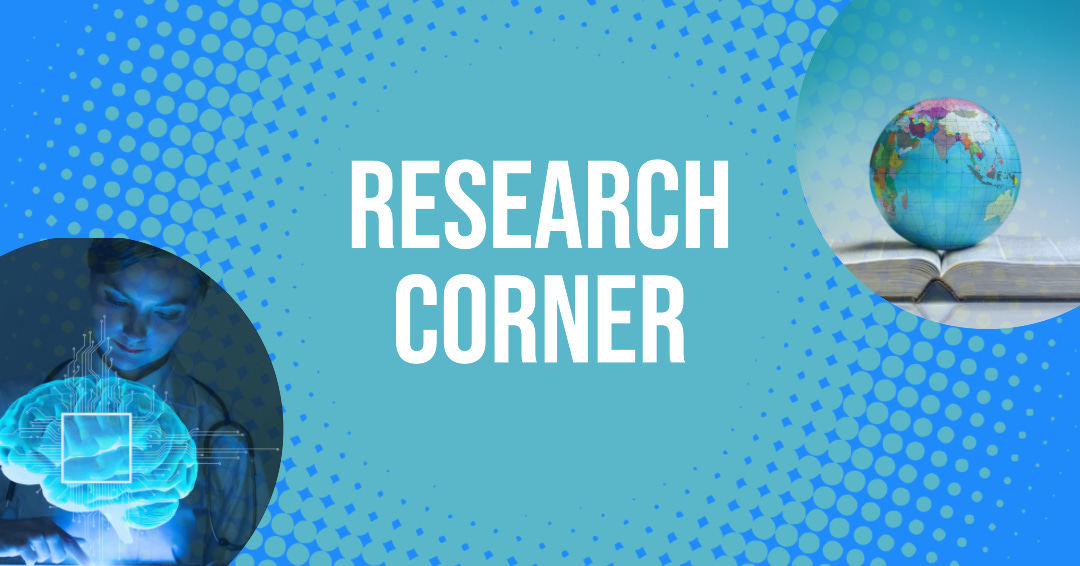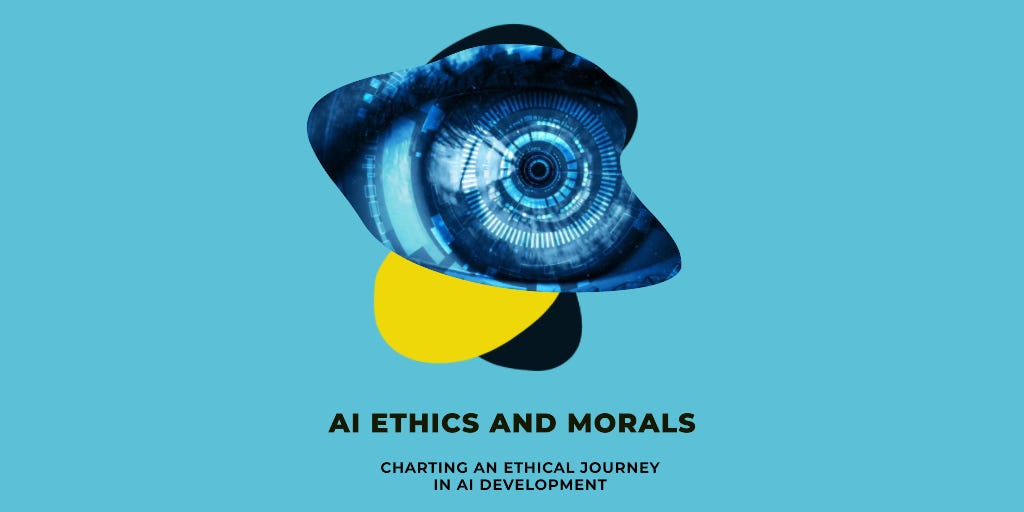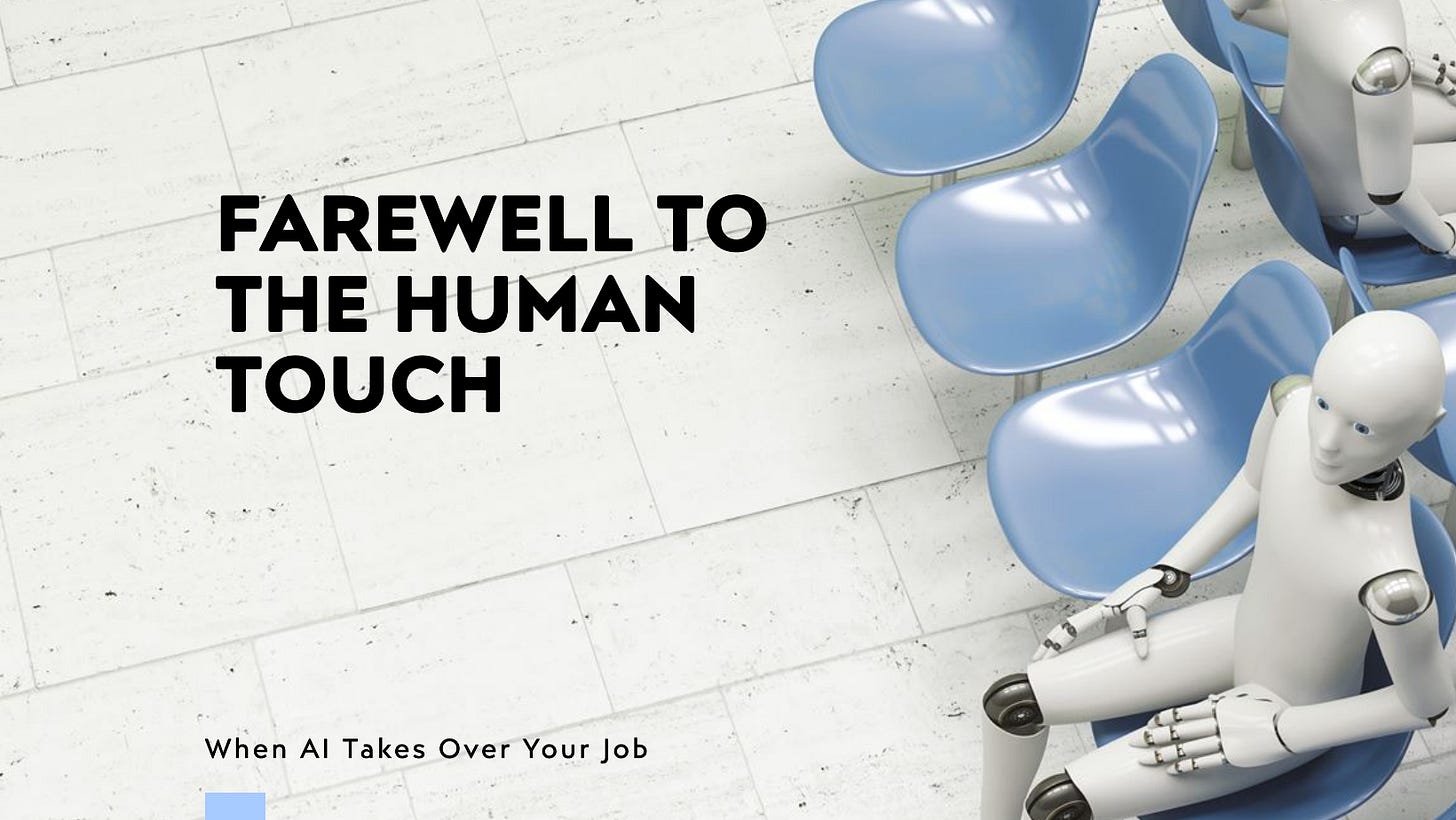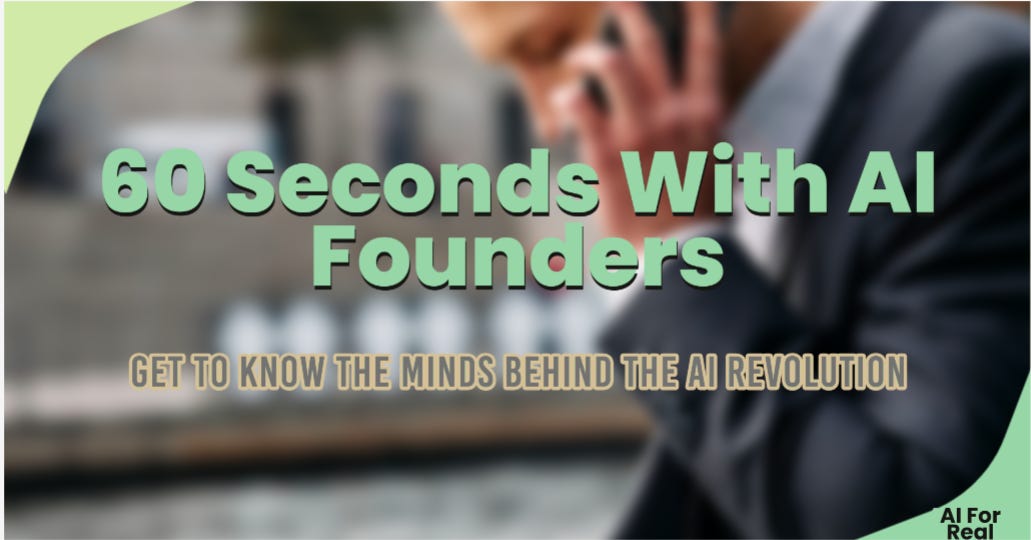AI, Philosophers, and the Shifting Dynamics of Work
Just why are so many philosophers involved with the world of artificial intelligence?
In today's rapidly evolving world, the omnipresence of AI is undeniable. This newsletter seeks to serve as your guide to the gradual yet profound transformation of job profiles across all industries.
As artificial intelligence (AI) continues to advance, it has begun to make inroads into sectors from healthcare to finance, from manufacturing to marketing. Slowly but surely, AI is augmenting and, in some cases, replacing human roles.
Week after week, we explore the impact of AI, examining its influence on various professions, its implications for the workforce, and the potential for innovation and adaptation.
BTW, if you didn’t know this, philosophers working in AI ethics significantly contribute to improving the workplace by actively shaping and refining ethical frameworks for AI systems used in professional settings, ensuring alignment with moral principles. This alignment helps to reduce the potential for harm and bias in the workplace.
But before I go deeper into this, let’s look at the AI Job Indicator’s movement in the week gone by.
Compared to the earlier week, AI clawed its way back into the job market, taking over some more jobs from humans.
In Today’s Newsletter:
What Drives the Proliferation of Philosophers in the Artificial Intelligence Domain?
Possess AI Expertise? Expect Premium Salaries!
Artificial Intelligence Assumes a Growing Role in Australian Recruitment
Jobs AI Might Not Take Over
Of AI Bias in Recruitment and Retention
19 Potential Job Opportunities Emerging from AI Innovation
AI is Changing Telecom Sector
AI Factories Coming
Govt Regulations Not the Panacea
Pew Survey: 70% Lack Trust in Companies' Responsible AI Use, 80% Wary of Data Collection
CEOs Worldwide Embrace Generative AI Investments, Cite Dual-Edged Potential:KPMG
Predicting Future Research Trends in the Age of Information Overload: Introducing 'Science4Cast,' an AI-Powered Tool
Facebook's AI Can Read Your Mind
Groundbreaking Chip Architecture Offers Accelerated and Energy-Efficient AI Advancements
Coming Up Next Week: London's AI Safety Summit
Stanford-Led Study Reveals AI Chatbots Spread Harmful Medical Ideas for Black Patients
Ex-Arkansas Governor and Religious Authors Launch Lawsuit Over Unauthorized Use of Their Books to Train AI
EU Nears Landmark Legislation Coming
AI Pioneers Unite with Experts to Spearhead AI Safety Framework
Study Reveals AI-Generated Phishing Emails Nearly as Effective as Human-Crafted Ones
Plus: Top Picks, and much more.
Why Are There So Many Philosophers in the Field of Artificial Intelligence?
Artificial intelligence (AI) is one of the most transformative technologies of our time. It can revolutionize every aspect of our lives, from how we work to how we interact with the world. But AI also raises some profound philosophical questions.
What does it mean to be intelligent?
What are the ethical implications of creating intelligent machines?
How can we ensure that AI is used for good and not for evil?
These are just a few of the many philosophical questions that researchers in the AI community are exploring. And precisely because of these questions, and then some, you find so many qualified philosophers as part of the AI community.
Philosophy is important for AI because it helps us to think critically about the technology and its implications.
Well-known Philosophers Connected With AI
Hilary Putnam (1926-2006) was an American philosopher who made significant contributions to the philosophy of mind, philosophy of language, and philosophy of mathematics. He was also interested in the philosophy of AI, and he wrote a number of important papers on the topic. In one of his most famous papers, "Minds and Machines," Putnam argued that computers cannot be intelligent because they do not have the same mental states as humans.
Nick Bostrom (born 1973) is a Swedish philosopher and futurist who is known for his work on existential risk, superintelligence, and the simulation hypothesis. He has written extensively on the potential dangers of AI, and he has argued that we need to take steps to ensure that AI is developed and used safely.
John Searle (born 1932) is an American philosopher best known for his Chinese room argument against the possibility of strong AI. The Chinese room argument is a thought experiment that is designed to show that even if a computer could pass the Turing test, it would not be truly intelligent.
Philosophers are also playing an important role in developing new AI technologies. For example, philosophers are working on developing AI systems that are more transparent and accountable. They are also working on developing AI systems that are more aligned with human values.
In short, philosophers are part of the AI community because they have something important to contribute. They can help us understand AI, develop AI ethically, and ensure that AI is used for good.
NEW
You Can Search This Newsletter Website For Answers To Questions On AI and Employment. Try it!
Have AI Skills? Then, You Can Command Premium Salary
Professionals equipped with AI skills have emerged as exceptionally sought-after assets, earning salaries that surpass the average pay by 21%, and in certain instances, going up as high as 40%.
These findings, unveiled in a study conducted by researchers at the Oxford Internet Institute and the Center for Social Data Science at the University of Copenhagen, underscore the lucrative value of AI proficiencies within the labor market.
The study highlights the pivotal role played by the high complementarity of AI skills – their ability to seamlessly integrate with a diverse array of other, often valuable, competencies.
An international research team examining 962 skills and the experiences of 25,000 workers confirmed that the economic worth of a skill is intricately linked to its aptitude for harmonious amalgamation with other competencies, a concept referred to as "complementarity."
The research further emphasizes the profound impact of burgeoning technologies, especially AI, on the valuation of skills. Notably, programming languages and data science have emerged as among the most prized proficiencies in this context.
Among the frequently sought-after AI skills, the study identified the top five with the greatest economic value, leading to a substantial increase in hourly wages for the worker:
Machine Learning (+40%)
Tensor Flow (+38%)
Deep Learning (+27%)
Natural Language Processing (+19%)
Data Science (+17%)
What Does It Mean For Us?
These findings underscore the increasing premium placed on AI skills within the evolving landscape of the job market. It sends a definitive signal that if you are additionally qualified in AI skills, you WILL earn more.
Source: Oxford Univ
AI Starts Playing Bigger Role in Recruitment in Australia
We all know that AI is increasingly assuming a critical role in hiring workers worldwide, particularly in activities like resume screening and initial interviews.
In Australia, this practice is growing in popularity, with one in three organizations having reported the integration of AI tools into their recruitment procedures.
Incorporating AI in recruitment is primarily seen as a means to efficiently handle vast quantities of candidate data and ensure a strong alignment between individuals and the organizations or roles they are being considered for. This approach can effectively mitigate the challenges and expenses associated with making incorrect hiring decisions.
Furthermore, a rising trend involves using AI for video interviews. This technology allows hiring managers to save time and expedite the recruitment process. AI aids in the evaluation of resumes and facilitates the administration of job-related tests to candidates.
Some experts, however, continue to view this as a high-risk endeavor. Concerns regarding bias in the recruitment and selection process continue to persist.
Instances have been documented in which programmers unintentionally introduced gender biases by feeding AI resume screening tools predominantly male resumes.
What Does It Mean For Us?
Australian firms join a growing list of companies worldwide that have started to deploy AI to hire staff. There are challenges, still. Yet, despite them, the overall consensus is that the application of AI in recruitment serves as a valuable tool for efficient information management and candidate selection, ultimately reducing both time and costs for organizations.
Source: theguardian.com
AI Resistant Jobs
We are often told that AI is coming for our job. Well, almost. There are some job profiles; however, they seem resistant to AI, especially those professions that embrace human qualities.
These professions, according to this analysis, remain impervious to the encroachment of AI due to their reliance on complex human interactions, creative expression, and specialized physical skills.
They are:
Event planners
educators
plumbers
electricians
welders
Carpenters
etc
Clergy, nurses, personal shoppers, culinary experts, fashion designers, emergency responders, artists, and social workers are similarly safeguarded by their dependency on human qualities and emotional connections, areas where AI falls short. Carpenters stand strong against AI intrusion through their blend of creativity, craftsmanship, and adaptability.
Event planners, on the other hand, leverage human creativity and interpersonal skills to address unique client needs and navigate unforeseen challenges, an area where AI cannot replicate the emotional intelligence, intuition, and personal touch vital for successful event planning.
Educators, notably vocational training teachers, offer not just information but emotional support, adaptability to individual learning styles, and valuable mentorship. They foster creativity and precision, traits beyond AI's reach, rendering teaching one of the least susceptible professions.
Nursing stands resolute against AI competition due to its provision of emotional support, medication administration, and swift, ethical decision-making. Human touch and intuition are indispensable in nursing, especially during illness, further cementing its AI-proof status.
Source: yahoo.com
…..where every week, I shortlist interesting articles, posts, podcasts, and videos on AI.
Of AI Bias in Recruitment and Retention
To learn more about how to mitigate bias in the use of AI in recruitment and retention, you may watch this YouTube video where Dr. Nicole Turner Lee, senior fellow in Governance Studies and the director of the Center for Technology Innovation at Brookings Institution, interviews Charlotte Burrows who is the chairwoman of The U.S. Equal Employment Opportunity Commission (EEOC).
<iframe width="560" height="315" src="
Charlotte discusses the challenges and importance of addressing AI in the context of worker protections, employee rights, and civil rights laws.
The conversation is focused on using AI in pre-screening job applicants and how it can unintentionally discriminate against individuals with disabilities, among others.
Charlotte emphasized the need to ensure equitable access to AI algorithms and the importance of upholding existing civil rights laws in the face of evolving technology.
19 Jobs That May Come Out Of AI Innovation
This article explores the 19 job roles expected to emerge due to AI innovation. It also delved into the far-reaching impact AI is poised to have on employment.
It looks at how companies NVIDIA Corp, IBM and scores of other companies have made remarkable strides in the realm of AI.
How AI is Changing Telecom
SK Telecom and Deutsche Telekom have forged a strategic alliance that leverages their expertise in AI technology and telecommunications services, marking a significant milestone for the Global Telco AI Alliance.
Their combined efforts are focused on developing a specialized Learning Layer Model (LLM) designed specifically for the telecom sector. This pioneering model seamlessly integrates AI technology, ushering in a new era of generative AI solutions and services. The ultimate goal is to enhance operational efficiency and elevate customer experiences within the telecommunications industry.
This collaborative venture strongly aligns with the overarching objectives of the Global Telco AI Alliance, which is committed to harnessing the potential of AI in the telecommunications domain. This partnership positions SK Telecom and Deutsche Telekom as frontrunners within the alliance, enabling them to shape AI technology and industry standards actively. Through their combined initiatives, these two industry giants are making remarkable progress in establishing themselves as global leaders in AI.
As pioneers of cutting-edge generative AI models and tools, this partnership aims to surpass other AI enterprises and establish new benchmarks in the telecommunications sector. Their endeavors not only solidify their position within the Global Telco AI Alliance but also propel them to the forefront of the global AI landscape. The collaboration between SK Telecom and Deutsche Telekom emerges as a driving force in advancing AI technology in telecommunications and propelling them towards global AI leadership.
Source: neatprompts.com
‘AI For Real’ Has Its Own Page On LinkedIn. Join, Now.
Subscribe to our YouTube channel: youtube.com/@aiforreal
AI Data Factories are Coming
Foxconn, a prominent name in the tech industry, has unveiled ambitious plans to construct state-of-the-art AI data factories in collaboration with American chip giant Nvidia. This strategic move forms a pivotal part of Foxconn's grand strategy to solidify its position as a major global electric car manufacturing sector contender.
These cutting-edge facilities, infused with the computational prowess of Nvidia's chips and software, will empower Foxconn to harness the capabilities of AI within their electric vehicles, thereby facilitating the creation of sophisticated software platforms tailored for the next generation of electric cars. According to Foxconn Chairman Young Liu, the company is in the midst of a profound transformation, evolving from a manufacturing service entity into a comprehensive platform solution provider, mirroring the business model that proved immensely successful in its partnership with Apple.
The collaboration between Foxconn and Nvidia heralds a transformative paradigm shift in software development. By harnessing the potential of advanced computing systems driven by Nvidia's cutting-edge chips, Foxconn aspires to create software capable of learning from everyday interactions, thereby ushering in an era of more intelligent and efficient electric vehicles.
Source: cnn.com
…..where every week, I shortlist interesting articles, posts, podcasts, and videos on AI.
Govt Regulations No Solution?
This is an interesting take on the involvement of governments in employment protection. Professor of Innovation at IE Business School Enrique Dans writes in Medium.com that government regulation is no solution to save people’s jobs going to AI.
He writes that government intervention in the form of AI regulation aimed at safeguarding job security not only lacks any concrete guarantees but could also yield potentially adverse outcomes. These consequences are likely to impact you, possibly well before your retirement, as well as have repercussions for your children and grandchildren, who may face a future with limited opportunities and a scarcity of innovative companies to be employed by.
Survey: 70% Lack Trust in Companies' Responsible AI Use, 80% Wary of Data Collection
According to a recent Pew Research survey, a significant 70% of respondents indicated a low level of trust in companies when it comes to making responsible choices about integrating AI into their products. The survey also shed light on concerns among Americans regarding AI's capacity to gather and analyze personal data.
The survey findings underscore the prevailing sentiments of the general public regarding companies employing AI in their products. A substantial 70% of those surveyed doubt these companies' ability to make responsible decisions concerning AI use. Moreover, a striking 80% expressed apprehension that these companies might employ AI-powered information in ways that are either disconcerting or unintended.
Public opinion varies regarding AI's potential to simplify daily life, with 62% believing it will do so. Interestingly, respondents under the age of 50 were more inclined to share this optimism, with 70% affirming this perspective, as opposed to 54% among those aged 50 and older.
Source: Pew Research
CEOs Worldwide Embrace Generative AI Investments, Cite Dual-Edged Potential:KPMG
The transformative wave of AI chatbots, which began reshaping industries in 2022, is prompting an increasing number of CEOs to embrace generative AI investments for their organizations, as revealed in KPMG's latest report.
The report highlights that 66% of Indian company CEOs and 70% of global firm CEOs actively consider generative AI as their foremost investment priority for their enterprises. This surge in interest is attributed to the growing demand for personalized content and the rapid evolution of AI algorithms, making AI integration an increasingly crucial component of effective business management.
The immense utility of Generative Artificial Intelligence is not lost on business leaders, with 77% of Indian CEOs acknowledging its dual-edged potential, according to the report. Globally, an even higher percentage, 88% of CEOs, shares this perspective on AI. The report underscores that a significant number of CEOs recognize AI's dual role in fortifying cyber security efforts while simultaneously creating fresh vulnerabilities for potential adversaries to exploit. Nevertheless, a notable 61% of CEOs express confidence in their organization's readiness to counter potential cyber threats, showcasing their commitment to navigating this transformative technological landscape.
Source: livemint.com
“Science4Cast”: AI-Powered Tool Predicts Future Research Trends in Age of Information Overload
The exponential growth of scientific publications in the realm of AI and machine learning (ML) has presented a formidable challenge for human researchers striving to keep pace with rapid advancements. To tackle this issue, Mario Krenn, a research group leader at the Max-Planck Institute for the Science of Light, has engineered a graph-based tool named Science4Cast. This innovative tool empowers researchers to envision the trajectory of AI research, forecasting which topics will dominate future studies. The efficacy of predicting these future research trends relies heavily on a thoughtfully curated assortment of network features.
Science4Cast operates by representing AI concepts as nodes within a graph, with interconnections between nodes denoting instances when two concepts were studied in conjunction. However, forecasting future research themes marks just the initial stage of this tool's potential. Krenn and his team have grand aspirations to enhance Science4Cast further, ultimately offering tailored suggestions to individual scientists for their forthcoming research endeavors. This personalized guidance has the potential to expedite scientific progress by steering researchers toward the most promising areas of inquiry. These groundbreaking developments have been detailed in a publication in Nature Machine Intelligence.
Source: techexplore.com
Have you subscribed to our 2nd newsletter All About Content?
Facebook's AI Can Read Your Mind. Well, Almost.
Meta of Facebook fame has unveiled a groundbreaking achievement in decoding the visual representations within the human brain through the application of magnetoencephalography (MEG), a non-invasive neuroimaging technique.
By capturing thousands of brain activity measurements per second, an AI system can dynamically reconstruct the images perceived and processed by the brain in real-time. This remarkable advancement enhances our comprehension of how the brain encodes visual information and paves the way for non-invasive brain-computer interfaces that can aid individuals who have lost their ability to communicate due to brain lesions.
The system comprises three key components: an image encoder, a brain encoder, and an image decoder, which collaborate to align MEG signals with image embeddings, enabling the generation of plausible images based on brain representations.
This breakthrough contributes significantly to our understanding of how the brain processes sensory input and encodes visual information. It could be used in the coming days in clinical contexts, where individuals with brain lesions may benefit from non-invasive brain-computer interfaces designed to restore their communication abilities.
What Does It Mean For Us?
This accomplishment is part of a larger trend where artificial intelligence and human thinking are coming together. The artificial neurons in the algorithm behave somewhat like the brain's physical neurons when they see the same image. This trend reflects the increasing tendency of AI systems to show human-like biases and learning patterns.
Research like this shows that as AI continues to advance, it will greatly expand our understanding of how the human brain works and how we think. While creating artificial brains is impressive, what's even more exciting is the idea of using these artificial brains to explore the complexities of human thinking and our "inner selves." To put it simply, as the researchers themselves stated, "In general, these findings are a crucial step towards deciphering the ongoing thought processes in the human brain."
Source: meta.com
Revolutionary Chip Architecture Promises Accelerated and Energy-Efficient AI
Imagine your brain on a computer chip? IBM's “NorthPole” is a brain-inspired chip, and has potential applications in autonomous vehicles, robotics, digital assistants, and more.
It aims to process vast amounts of data in real-time, making it suitable for handling edge cases in challenging scenarios.
The technology leverages brain-inspired computing principles for greater efficiency and performance gains and represents the culmination of years of research at IBM Research.
Source: ibm.com
Coming up: London's AI Safety Summit
Everybody who is something in AI is looking forward to the upcoming AI Safety Summit in London starting Nov 1.
This event is all about diving into the complexities of advanced artificial intelligence. It is expected to go beyond the technical jargon to help us grasp AI's double-sided nature - its potential to revolutionize our world and the challenges it poses.
The progress in AI technology holds the promise of a better future, offering improved productivity, creative solutions, and solutions to long-standing problems. However, it also raises important questions about how it might be misused, its unpredictability, and the unforeseen challenges that may arise.
Taking a closer look at the summit's agenda, you'll see it covers a wide range of topics. While many sectors are in the spotlight, smaller grassroots innovators and those dealing with the real-world impact of AI may feel somewhat overshadowed. There are questions about how inclusive it is for non-profit organizations and community-driven projects, especially when the 'AI for Good' panel appears to lean towards corporate interests. The presence (or absence) of ethical frameworks and guidelines is also under scrutiny. The summit's approach is comprehensive, but there's always room for improvement.
The summit will go into strategies for managing risks, progress in making the summit more inclusive, and the potential for global collaboration. It will also shed light on what happens after the summit, revealing proposed steps for action and how we can make these efforts sustainable.
Whether you're a regulator, a tech enthusiast, a seasoned industry pro, or just a concerned global citizen, the trajectory of AI is not just a passing tech trend. The AI Safety Summit is the start of a crucial conversation. It's up to all of us to nurture and guide this discussion, making sure that AI's growth remains both innovative and responsible.
Source: UK Govt
Exciting Opportunities for Newsletter Sponsorship!
Discover available ad and sponsorship slots for this newsletter by clicking on this link. Explore the various packages to find the perfect fit for your brand.
If you would like further information, please don't hesitate to contact me. Let's collaborate and customize the best deal tailored to your specific needs. Click on the tab above. Or, for individual requirements, write to marketing (at) newagecontentservices.com
Stanford-Led Study Reveals AI Chatbots Spread Harmful Medical Ideas for Black Patients
A recent study led by Stanford University reveals that chatbots like ChatGPT and Google's Bard are disseminating erroneous and harmful medical information, potentially exacerbating healthcare disparities among Black patients. There is growing concern among experts that the increasing use of these chatbots in healthcare may inadvertently perpetuate medical racism.
The study examined the responses of OpenAI's ChatGPT and GPT-4, as well as Google's Bard and Anthropic's Claude. Disturbingly, these chatbots, trained on internet text, provided responses containing misconceptions regarding healthcare for Black patients.
What's particularly troubling is that all of these AI models incorporated race-based considerations to varying degrees when addressing issues related to kidney and lung function. This introduces a significant risk of misdiagnosis or delayed medical care for Black patients. Notably, two of the models also delivered inaccurate information about differences in muscle mass among Black individuals.
Source: nature.com
Ex-Arkansas Governor and Religious Authors Launch Lawsuit Over Unauthorized Use of Their Books to Train AI
This is just one more example of the Black Box approach used by some of the big tech firms in training their AI models, and the ire expressed by those whose works seem to have been plagiarised.
Former Arkansas governor Mike Huckabee and a coalition of religious authors have initiated legal proceedings against a consortium of technology companies, alleging the unauthorized utilization of their literary works for training AI tools.
This lawsuit, which was formally lodged in a New York federal court on Tuesday, marks the latest addition to a growing series of legal actions aimed at tech companies accused of employing text extracted from the internet to train AI systems. This controversial practice has played a pivotal role in the development of advanced chatbots such as ChatGPT by entities like OpenAI and Google, igniting fierce competition in the AI tools market.
Source: washingtonpost.com
EU Nears Landmark Legislation: World's First AI Laws Set to Regulate and Safeguard Society
The European Union is on the brink of a historic milestone, poised to introduce the world's first laws governing artificial intelligence. These groundbreaking regulations would empower Brussels with the authority to shut down services that pose a threat to society following four years of dedicated development by the AI tsar.
The forthcoming EU AI Act is expected to encompass a wide spectrum of rules, ranging from addressing the use of AI in the creation of homemade chemical weapons to tackling issues of copyright infringement, encompassing domains like music, art, and literature. Negotiations surrounding the final text of this landmark legislation are reaching a critical juncture, with MEPs, EU member states, and the European Commission converging on a resolution during discussions this Wednesday.
Source: theguardian.com
Introducing Our New Segment: I lost My Job To AI
Machines are taking over jobs worldwide. Sometimes in bulk, other times, individual jobs. The human worker who has been given the pink slip suddenly finds that nobody is listening. But we care. If you have lost your job to a machine, and want to tell the world about the impact on your life, and perhaps how you are weathering the blow, send us an email to marketing (at) newagecontentservices.com with the subject line: “I Lost”. No matter where you are located.
We shall revert ASAP. *
(*T&Cs apply)
AI Pioneers Unite with Experts to Spearhead AI Safety Framework
Yoshua Bengio and Geoffrey Hinton, revered as AI trailblazers, have teamed up with 22 other prominent AI scholars and professionals to unveil a comprehensive framework for policy and governance. Their collective endeavor is directed towards mitigating the escalating risks tied to artificial intelligence.
The paper emphasizes a crucial directive, suggesting that both companies and governments allocate a significant portion, amounting to one-third, of their AI research and development budgets toward the vital realm of AI safety. It underscores the urgency of advancing specific research breakthroughs, aimed at fortifying AI safety measures and ushering in a safer AI landscape.
Source: venturebeat.com
AI-Generated Phishing Emails Prove Nearly as Effective as Human-Crafted Ones, Reveals Study
A new study has found that emails written by ChatGPT and other gen-AI tools were almost as effective as those written by humans.
When the final email was dispatched to 800 employees within a global healthcare corporation, the outcome just about narrowly favored the human-generated phishing email, with the click-through rate for it at 14%, compared to the AI's close 11%.
The key factors contributing to the human team's success were emotional intelligence, personalization, and concise subject lines. The human endeavor established an emotional connection with employees by grounding the content in a specific example within the company. In contrast, the AI chose a more generalized theme.
Notably, the AI-generated email also yielded a higher reporting rate at 59%, compared to the human phishing report rate of 51%.
Source: venturebeat.com
- Your story matters. Your innovation matters -
If you are an AI entrepreneur*, startup founder, etc, and are eager to say your piece in under a minute, drop in an email with the subject line: “Yes, to 60 secs” to marketing (at) newagecontentservices.com We promise to revert ASAP.



